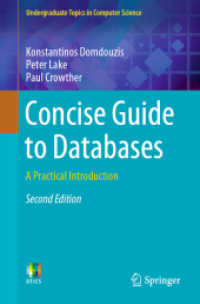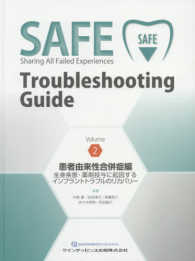- ホーム
- > 洋書
- > 英文書
- > History / World
Full Description
This book is dedicated to Claudia Römer and brings together 33 contributions spanning a period from the 15th to the 20th century and covering the wide range of topics with which the honouree is engaged. The volume is divided into six parts that present current research on language, literature, and style as well as newer approaches and perspectives in dealing with sources and terminologies. Aspects such as conquest, administration, and financing of provinces are found as well as problems of endowments and the circulation of goods in the Arab provinces of the Ottoman Empire. Another main topic is dedicated to minorities and their role and situation in various provinces and cities of the Ottoman Empire, as represented by various sources. But also topics like conversion, morality and control are illuminated. Finally, the volume provides an insight into the late Ottoman and early republican period, in which some previously unpublished sources (such as travel letters, memoirs) are presented and (re)discussed. The book is not only aimed at scholars and students of the Ottoman Empire; the thematic range is also of interest to linguists, historians, and cultural historians.
Contents
Abbreviations
List of Figures and Tables
Contributors
Publications by Claudia Römer
Notes on Names, Terms, and Transliteration
Introduction
Hülya Çelik, Yavuz Köse and Gisela Procházka-Eisl
Part 1: Language, Literature and Style
1 Bu neyiki? "What (on Earth) Is That?!"
The Old Anatolian Turkish Mirative Particle iki in Unresolvable Questions
Helga Anetshofer
2 Questions, Answers, and Knowledgeable Ladies in an Ageless Turkic Textual Genre
Ingeborg Baldauf
3 More of the SAME: Is There a Standard Average Middle Eastern?
Gisela Procházka-Eisl and Stephan Procházka
4 Coffee's Elegy on the Death of Tobacco, 1636-1637 by Vardarlı Fazli
An Ottoman Social Parody and its Linguistic Particularities
Edith Gülçin Ambros
5 Alexandros Karatheodoris and His Philological Articles on the Ottoman/Turkish Language
Peri Efe
Part 2: Sources and Terminologies: New Readings, New Perspectives
6 Some Remarks on Marginal Notes in Ottoman Manuscripts
Marinos Sariyannis
7 Ottoman Sofia through the Eyes of Its Denizens and Visitors
(Late 14th-First Half of 16th Century)
Rossitsa Gradeva
8 Réflexions sur le processus de rédaction des Ġazavāt-ı Ḫayr ed-Dīn Paşa
Nicolas Vatin
9 Peacemaking between the Ottoman Empire, the Medieval Kingdom of Hungary and the Habsburg Monarchy
Sándor Papp
10 Traces of the Captive Copyist Derviş İbrahim in Sebastian Tengnagel's (d. 1636) Notebooks
Hülya Çelik
11 Learning the Language of Things: Glimpses into Ottoman Inventories of the 16th and 17th Centuries
Hedda Reindl-Kiel
12 Ottoman History Viewed from the "Periphery": Al-Isḥāqī's 1623 Chronicle of Egypt
Jane Hathaway
13 Time-Related References and Markers in the Kadı Court Registers of Kandiye (Heraklion)
Antonis Anastasopoulos
Part 3: Conquering, Administering and Financing Ottoman Provinces
14 On the Administration of the Ottoman 'One-Fifth Tax' on Prisoners of War (15th to 17th Century)
Pál Fodor
15 Exchange Rates, Pay Years and Prebends in 17th-18th Century Ottoman Europe as Reflected in Taxation and Funding the Military
Some Key Examples
Nenad Moačanin
16 Financial Reporting from the Ottoman Syrian Provinces
A Study On Provincial "Budgets," the Income Side
Linda T. Darling
17 The Sancakbeyis of Hatvan in the 16th Century
Géza Dávid
18 Paths of Glory: The Rise of the Köprülüs and the Execution of Şamizade Mehmed Efendi (1663)
Özgür Kolçak
Part 4: Founding Mosques, (In-)alienable Waqfs, and Circulating Goods
19 Reflections on the Problem of Identifying the Founder of the Mosque of Ferhad Beg in Pécs
Nedim Zahirović
20 "A Man You Do Not Meet Every Day"
The Waqf Founder as a Benevolent Employer and the Waqf as a Sinecure for the Founder's Retainers
Kayhan Orbay
21 Sorge und Vorsorge
Das Testament (vasiyetname) eines osmanischen Kavallerieoffiziers vor dem Feldzug 1664 und die Fromme Stiftung (vakıf) eines Oberstallmeisters vor einer Dienstreise nach Mekka im Jahre 1681
Hans Georg Majer
22 The Place of Egypt and Syria in the Circulation of Goods in the Eastern Mediterranean
The Abiding Importance of the Ottoman Domestic Market as a Key Dimension of Overall Maritime Trade in the Mid-18th Century
Rhoads Murphey
Part 5: Minorities, Moral and Control
23 Die politische Balkandiaspora im Abendland des 15. Jahrhunderts
Oliver Jens Schmitt
24 Zur Überlieferungsgeschichte des Ahdname von Fojnica
Michael Ursinus
25 Grievance Redressal and Ecclesiastical Appointments
Sultanic Rescripts in Favour of Metropolitans and Bishops from the 17th Century
Eleni Gara
26 Living Together in the Quarters of a City
Non-Muslims in the Judicial Registers (Şerʿi Mahkeme Sicilleri) of Trabzon in the Second Half of the 17th Century
Kenan İnan
27 İbrahim Efendi (d. 1697), an Ottoman Scribe Turned Dominican Monk, and His Library between Constantinople and Venice
Tijana Krstić
28 Becoming a Master Artisan in the Early Modern Ottoman Empire
Central Provinces, Late 1500s to Early 1800s
Suraiya Faroqhi
29 Night Life in Istanbul: Sex Crimes and Social Control from the 18th to the Early 20th Centuries
Fariba Zarinebaf
Part 6: The Empire at the Dawn of the Twentieth Century and beyond
30 Strolling around Vienna Unarmed. Rıza Nur and His "Letters from Vienna" (1911)
Yavuz Köse
31 Some Remarks on the Hitherto Unpublished Memoirs of a Member of the Kuva-yi Milliye in the Sanjak of Alexandretta/Hatay
Heidemarie Doğanalp-Votzi
32 Making the Best of It. The Graduates of the Kindergarten Training College of Flaviana in Zincidere, 1911-1916
Maria A. Stassinopoulou
33 Heritage Discourse in Early Republican Turkey: The Journal Ülkü (1933-1950) Re-Examined
Ayşe Dilsiz Hartmuth
Index








